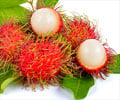Fruit flies will consume alcohol until they are intoxicated and enjoy it more and more over time, much like a human alcoholic, says a new study.
Fruit flies will consume alcohol until they are intoxicated and enjoy it more and more over time, much like a human alcoholic, says a new study.
"The flies choose to consume alcohol to intoxicating levels, they will do so even if alcohol is made unpalatable, and they relapse to drinking high levels of alcohol after being deprived of it," said Ulrike Heberlein of the University of California, San Francisco."Addiction is a purely human condition, but, surprisingly, flies show several key features of it," Heberlein added.
Heberlein says studying a model of alcoholism in a simple organism like the fruit fly may lead to a better understanding of the problem in humans.
In the study, researchers found that flies prefer to consume ethanol-containing food to regular food, and that the insects' preference increases over time.
The researchers showed that flies are attracted to the smell of the alcohol, but they actually don't like its taste.
Their attraction to alcohol isn't explained by the immediate sensory experience of it, or by its calories. Nevertheless, flies self-administer ethanol to intoxicating levels.
Advertisement
Heberlein doesn't really know in the case of the flies what drives the behavior, but she says she can only assume that they find alcohol rewarding and therefore choose to drink it despite its adverse consequences.
Advertisement
The study has been published online in Current Biology.
Source-ANI
RAS













